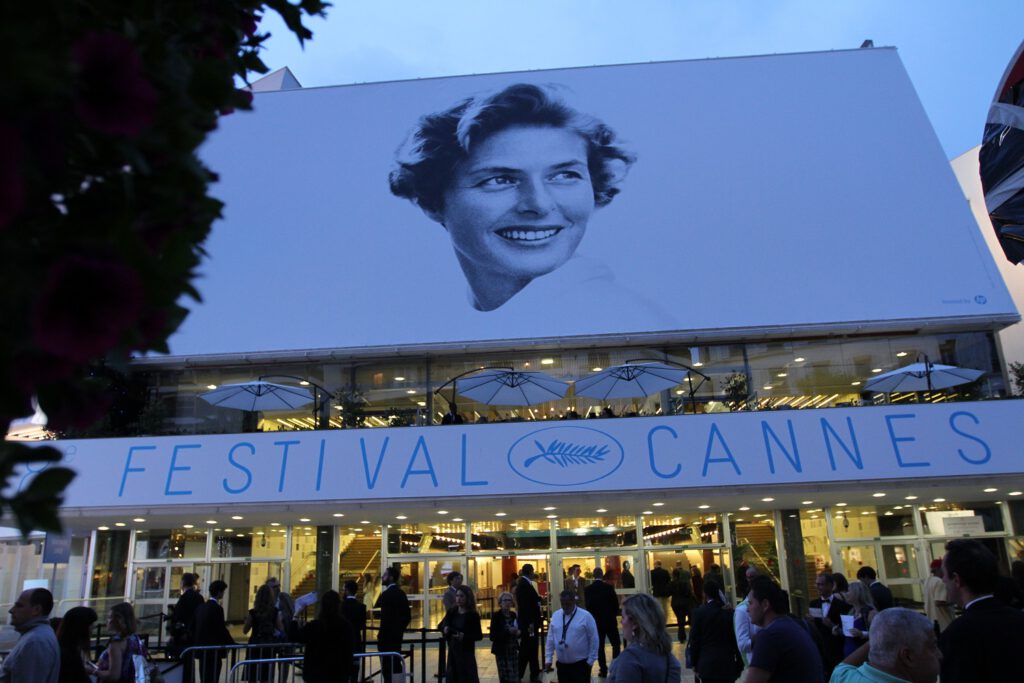As I write these words, I am sitting on the
cold tile floor of the Palais des Festivals, Cannes’ chief venue, sporting four of
the largest screening rooms, all bearing names of cultural legends: Lumière,
Debussy, Bazin and Buñuel. The movie I am hoping to see is Joachim Trier’s
competition entry, “Louder than Bombs”. I took my place at the very front of
the line, so I think my chances of getting in are pretty high. I can now relax.
The screening starts in two hours.
The art of queuing may be forgotten elsewhere,
but at Cannes we owners of the blue and yellow festival badges get the chance
to perfect it every year. As we watch the lucky “pinks” (or: holders of pink
badges, second only to white ones over here) whizz by and enter screenings
first, the sense of envy among the “blues” and “yellows” is palpable: only last
night, just before I got shut out of a screening of Todd Haynes’ “Carol” (I
miscalculated and showed up only an hour and a half before), I saw a fierce-looking
Italian lady shake a fist in the direction of the fast-moving pink queue and
saying: “Rosso!” as if she was saying: “Let’s tear down the bastille!”.
The whole system of dividing journalists into
priority groups is a necessity at a place like Cannes; at any given time the
number of people wanting to see the films is larger than the available seating.
Still, the key of assigning color badges to people is so mysterious and
non-transparent, it causes controversy every single year. Big outlets get
“blue” all of a sudden, smaller ones are inexplicably granted a “pink” – and
gossip starts brewing. “Did you hear of such-and-such…? He got pink and he’s
only here for a first time?”. “Did you hear of Steven…? Got demoted to blue, I
feel really bad for him…” Professor Zimbardo himself wouldn’t be able to devise
a psychological game more engaging and pernicious than this.
Still, as much as I hate the long queuing, I
take perverse pleasure in its small rituals. Since my scheduling is close to
that of several of my friends, I usually run into them just as I enter the
queue: the sense that we are in it together (and that just in case one of us
can run and grab the others a sandwich or a coke) is reassuring. Also, where
else would we get a chance to spend so much time together, actually talking and not merely exchanging
messages and/or likes on Facebook? Even though some people curl up with their
laptops and others get immersed in their Kindles (usually just finishing novels
that were adapted into movies just about to premiere at the Festival, like
Patricia Highsmith’s “The Price of Salt”), most people do talk and get to know
each other, even if the initial bonding impulse comes from a jealous remark
thrown in the general direction of the “pink” line.
Another ritual, of course, is to discuss
competition movies and predict the jury’s verdict way ahead of the festival’s
end. “It’s the Coens, they gotta award Lanthimos!” is the line that gets
repeated the most this year, just like the words “Van Sant” have become enough
to crack people up in the wake of the disastrous screening of “The Sea of
Trees”. The sun may be scorching (thank God it hasn’t really rained this year!),
the hand of your watch may seem to go backwards at times, but you are not alone, and you get to moan and bitch all you want; no one will judge you, since,
yet again, we are all in it together.
And then… the beeping starts. The first “blue”
admitted and having their badge scanned with an electronic beep sends a joyous
wave down the queue, together with some anxiety for the very end of the line
(“Will we get in…?”). We start to move, slowly but surely, to the accompaniment
of the security guys urging us to remain calm. As we get closer and closer to
having our own badge scanned, the flow of the line will get checked every once
in a while: the festival staff is making sure there are still seats at the
balcony. Once that much-awaited beep of our own comes, we hand in our backpack
for the cursory security check with a smile. The seat we will get may be at a
slant that makes all the on-screen faces look slightly Edvard Munch-ish, but
still: we’ve made it. The lights go down. The Cannes intro begins: a succession
of red-carpeted stairs hovering in mid-air and guiding us from the depths of the
sea to the starry night, accompanied by Saint-Saëns’ “Le carnaval des animaux”.
Before we know it, our hands are clapping. We are here, at the Cannes Film Festival,
about to see a world premiere of something special – and we suddenly realize
just how lucky we are.












